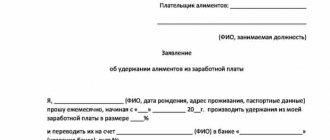Alimony for a child born outside of a formal marriage union
Family law imposes an obligation on parents to participate in the maintenance and upbringing of their children, regardless of the status of the relationship between father and mother.
The legislator also established the possibility of the parent with whom the minor lives to apply for the assignment of payments if there is no information about the father on the birth certificate.
The process of assigning alimony for a child born without marriage between his father and mother has some distinctive features, however, the amounts of assigned payments remain the same for all biological parents.
In the event of death of a party
The concept of refusal of alimony obligations is not provided for by the legislation of the Russian Federation, but in legal practice there are examples of refusal by the alimony recipient to pay alimony. The waiver of alimony encumbrance can be secured by concluding a bilateral agreement certified by a notary.
In this case, the refusal indicates the reason for the termination of alimony obligations specified in the document. If the contract does not indicate a reason, the notary will not be able to certify the document, and the court may reject the decision to refuse.
The reasons why alimony encumbrance may be canceled may be:
- transfer of the alimony payer’s property, with the right of ownership, to the child;
- payment of a large lump sum of money;
- permission for a child to travel abroad.
Waiver of the alimony obligation must be agreed upon with the guardianship and trusteeship authorities of both the payer and the recipient of alimony.
If one of the parties to alimony obligations dies, the process of termination of alimony payments occurs, both under a writ of execution and under a voluntary agreement.
The legislation of the Russian Federation provides a basis for termination of alimony support; such a basis is the dependent’s reaching the age of majority.
An adult is considered to be:
- a person who has reached the age of 18 years,
- a child who has reached the age of 16, who is employed or registered as an individual entrepreneur, has a permanent income;
- A 16 year old child who got married.
Debt on alimony payments can be collected upon the child reaching the age of majority, as well as upon early emancipation, which was established by a court decision, subject to the statute of limitations of the case (3 years);
Alimony outside marriage: grounds under the law
The obligation of citizens to support their heirs until they reach adulthood is enshrined at the level of the Russian Constitution (Article 38).
The main document that establishes the procedure, grounds for appointment and amount of alimony is the Family Code of the Russian Federation. Duplication of the duty of mother and father to provide for the child takes place in Article 80 of the RF IC. This norm indicates that parents must satisfy the material needs of their children until they reach 18 years of age.
The codification of family law norms does not indicate the impact of the presence or absence of a marriage certificate from parents on the need to take care of their children, i.e. What matters is only the biological relationship of the child with the father or mother, and not the status of the relationship between them.
The procedural side of assigning alimony payments is regulated by the Civil Procedure Code of Russia.
The responsibility of unscrupulous fathers and mothers who evade participation in the material support of their child is established by the Criminal Code of the Russian Federation.
Alimony agreement
The parties have the right to enter into an alimony agreement in which they independently determine the amount of alimony due to the child.
Note! Requirements for alimony agreement under Art. 100 IC RF:
- must be in writing;
- notarized;
- the amount of alimony specified in the agreement cannot be less than the amount required by law.
Since the alimony agreement is a civil transaction, the rules of the Civil Code of the Russian Federation apply to it: it cannot be terminated unilaterally, it cannot be changed unilaterally.
What do you need to file for alimony without being married?
You can apply for alimony payments on account of a minor born out of wedlock if there are the following grounds:
- confirmation of the presence of family ties through the civil registry office (establishment of paternity);
- the presence of a court decision that confirms the blood relationship of the potential alimony payer and the child;
- there was a fact of adoption of a child of a woman (man) without marriage.
Paternity established or not
The main act indicating the relationship of parents with their heirs is the birth certificate, the registry office with the appropriate recording of statements about the baby. The relevant information about the father and mother is entered on the basis of Federal Law No. 143 of November 15, 1997 and Resolution No. 432 of April 17, 1999.
The presented documents provide several ways to fill out the “Father” column in the birth certificate of a child born out of wedlock:
- from the words of the mother (in cases where the biological father does not want to recognize his child);
- when establishing paternity (the father is present at registration or gives written voluntary consent to enter data about him in the registration record as one of the parents).
How to become a parent through court
If the parent himself wishes to confirm the fact of his paternity, then he must file a claim in court. The application will need to be accompanied by:
- identification document (passport),
- child's birth certificate,
- evidence of the relationship between him and the child (ideally this is a 99.9 percent positive DNA test result, as well as documentary sources, joint photographs and witness statements),
- a document confirming the death of the child’s mother, a court decision declaring her incompetent or deprived of parental rights, etc.
Deadlines
Applications of this type, both to establish paternity and to transfer child support, can be submitted at any time, starting from the moment the child is born. It should be borne in mind that the longer this is delayed, the lower the amount of alimony will be, since payments for the past period are accrued only in exceptional cases, when the plaintiff really did not have the opportunity to submit an application earlier and can prove it.
- After the child reaches the age of 18 (the most common option).
- After the child returns to official work.
- After the child gets married or gets married.
The exception is situations when the child is disabled and does not have the ability to support himself. In this case, payments must continue until the situation changes or until one of the parties dies.
How to arrange and collect alimony from your common-law husband?
The legislator provides the following ways of imposing on a parent living separately from a child the obligation to make payments towards his financial support:
- on the basis of voluntary consent by the former common-law spouses drawing up an agreement on participation in the maintenance of the child, certified by a notary (the amount of payments, the timing of their payment and other nuances are decided by the parents independently, taking into account the requirements of the legislator);
- through the court (drawing up and sending a statement of claim, making a decision by the court, receiving a writ of execution);
If the father and mother of the baby have chosen the first of the above methods, the parent living separately must independently fulfill the terms of the agreement. If the assigned obligations are ignored, the agreement may be submitted for enforcement to the bailiff service or to the accounting department of the enterprise where the unscrupulous parent is employed.
Agreement on payment of alimony in a civil marriage
The presented agreement is drawn up on the basis of the voluntary consent of both parents, after which it is certified by a notary.
The legislator has provided the opportunity for former common-law spouses, in the absence of disputes between them, to independently determine the methods of making payments, their intended purpose and amount (cannot be lower than the minimum amount provided by law).
Notarial services
To certify the agreement by a notary, you must provide a set of required documents:
- identification documents from both parties (passports);
- birth certificate of the baby;
- official paper establishing paternity;
- a document provided by the enterprise (organization) where the alimony payer is officially employed;
- bank account or card details for making transfers.
In addition to the specified documentation, you will need to pay for notary services: if the agreement is drawn up yourself - 250 rubles.
How to establish paternity
Not a single woman will be able to claim alimony for the maintenance of a child from his second parent if his birth certificate contains handwriting in the “father” line. She needs to find out how to establish paternity, and only then can she apply for child support.
It is very important to find out the reason for this dash:
- the father does not renounce his relationship with the child, he simply did not have the opportunity to be in the registry office when registering the newborn,
- the father refuses to recognize the child as his own, or has never even met him,
- The child’s mother is categorically against having information about his biological father included in the document.
This is important to know: Application for child support without marriage: sample form
It happens that proof of the relationship between the father and the child is necessary due to the fact that his mother has died, been declared incompetent by the court, or has been deprived of parental rights to the child.
It is for this amount of debt and above that this sanction is applied.
How to apply for alimony in court for a common-law husband in Russia?
A claim demanding to oblige the second parent to participate in the maintenance of the child is drawn up in accordance with the general requirements. Includes:
- header (information about the court to which the document is being submitted, information about the parties (full name, date of birth, addresses, telephone numbers, email of the applicant and the defendant);
- the main part (a comprehensive description of the circumstances underlying the claim - the refusal of a parent living separately to take part in the material support of the child);
- an indication of the amount of alimony payments that the applicant wishes to recover from the defendant on account of the common heir.
The amount of alimony must be documented (receipts for payment for clubs, sections, purchases of clothing, treatment, etc.)
- normative justification for the requirements put forward (links to articles of laws);
- requirements (to impose an obligation to pay alimony, and if at the same time you apply for a determination of the blood relationship between the defendant and the child, paternity is also required to be established).
The statement of claim, when submitted to the court office, is accompanied by a set of required official papers:
- the applicant's identity card (Russian passport);
- a document evidencing the registration of the birth of a child;
- papers confirming adoption (if any);
- acts confirming the relationship of the defendant and the minor (if such documents are available);
- certificate of family composition (extracts from the house register);
- official documents confirming the income of the parent living separately from the child.
Where to go
Cases in which the subject of the dispute is the assignment of alimony payments from one of the parents on account of a minor child are dealt with by magistrates' courts.
The territorial jurisdiction of the category of alimony cases is determined by the place of residence of the plaintiff, i.e. the statement of claim should be submitted to the court office at the place of residence of the applicant.
Required Criteria
If you are thinking about how to get rid of child support, then you should distinguish between the reasons that may exempt the alimony payer from paying money and the circumstances that serve as the basis for canceling child support obligations.
In what cases is child support not paid? Reasons exempting from alimony payments include:
- the dependent's reaching the age of majority (18 years);
- early employment/marriage (not earlier than 16 years);
- death of one of the participants in the alimony obligation - the alimony payer or alimony recipient;
- adoption of a ward who has not reached the age of majority.
In accordance with the provisions of Art. 119 of the RF IC, the amount of alimony calculations, during a court hearing, can be reduced if the alimony payer can provide documents that will prove that his financial situation has undergone significant negative changes that interfere with the legal procedure for calculating alimony payments. At the same time, to make a decision, the court will take into account the interests of the child or one of the former spouses.
The RF IC does not provide an established list of reasons that can reduce the amount of alimony payments. But in judicial legal practice, the following valid grounds can be identified that allow one to influence a change in the amount and procedure for paying alimony:
- The onset of disability (group I, II or III), as well as any other illness or injury of the alimony payer that affects temporary or permanent disability. Under conditions of disability or injury, the citizen who pays alimony needs financial resources for treatment or rehabilitation.
- Receipt by a child of an inheritance or transfer, under the terms of a gift agreement, of material and intangible benefits, as well as securities that can change the financial situation of a dependent by increasing monetary security. In this case, the court will review the alimony payer’s obligation to pay alimony.
- Emancipation of a child under the age of majority. If a child, upon reaching 16 years of age, is employed, is engaged in his own business, gets married, or has the financial opportunity to be self-sufficient without the help of his parents.
- Whether the alimony payer has other responsibilities for alimony payments. For example, if the alimony payer has a child in a new marriage who needs financial support, then the amount of alimony payments should not exceed a third of the actual income of the alimony payer.
- The amount of alimony payments will be reviewed by the court and reduced if the child is transferred to state support: a boarding school, an orphanage or a specialized hospital. In such cases, the court may satisfy the request of the alimony payer and review the amount and procedure for payment of alimony.
- If a person paying alimony experiences a sharp improvement in their financial capabilities. In this case, the court may reduce the percentage of monetary payments calculated from income, since the alimony payer must provide for the needs of the child, and not the personal expenses of the ex-wife.
- The presence of other financial burdens on the alimony payer. For example, the alimony payer supports disabled parents who are in need status.
The legislation of the Russian Federation does not limit the list of listed grounds on which a reduction in alimony payments may depend. Since the court must provide documentary evidence that the alimony payer cannot support a minor dependent, through the previous order of alimony payments adopted by law.
It is also worth considering in what cases alimony is paid. As legal practice shows, the court does not recognize the following circumstances as grounds for reducing alimony payments:
- a high level of material wealth, a parent caring for a joint child or children;
- health problems of the alimony payer that are not causes of temporary or permanent disability;
- if the child receives a state benefit or pension provided by social protection authorities;
- presence of debt obligations of the alimony payer (outstanding loan);
- refusal to provide data on alimony expenses, i.e. if the alimony payer demands that the ex-spouse be provided with a documentary report on the alimony funds spent on child support;
- the child receiving an inheritance that provides intangible value, as well as receiving as a gift securities that do not generate income that can be used in the present time.
We suggest you read: Is it possible to register a child with his grandmother in an apartment without parents?
A reduction in alimony support when a child is born to the alimony payer in a second marriage is a fairly common reason for satisfying a claim, and other circumstances presented above are unlikely reasons for satisfying a claim for revision of alimony payments.
It is necessary to consult a family lawyer on arguing positions to resolve issues of deduction of monthly child support that are associated with temporary financial difficulties of the alimony payer. Since evasion of alimony payments is punishable in accordance with the legislation of the Russian Federation.
Sample application to the magistrate's court for the issuance of a court order
An application to the magistrate's court for the issuance of a court order to assign alimony payments is submitted if there is documentary evidence of the presence of family ties between the potential alimony payer and the child on whose account the payments will be collected.
The submitted application must be drawn up in accordance with the general requirements.
Example of a claim for collection of payments for a child in a civil marriage
Example of a claim for collection of payments for a child born in marriage
Amount of alimony outside of marriage
The amounts that can be collected for the maintenance of a minor from a parent living separately do not differ from the amounts of alimony for parents who are former spouses.
For one child - a quarter of the income.
For two people - a third of the earnings.
For three or more – half.
Accrual methods
The calculation methods are also the same for all parents who do not live with the minor:
- As a percentage of the total amount of all income received by the alimony payer monthly.
- In the form of an amount established by the court (cannot be less than the amount of payments established by law, calculated taking into account the real confirmed financial needs of the child, the financial viability of the alimony payer and whether the latter has other obligations to execute court documents (monetary form)).
Non-payment
Administrative criminal liability may be applied to an unscrupulous parent who fails to fulfill the assigned obligation to pay child support payments.
In the form of administrative sanctions, a fine or a ban on crossing the customs borders of the Russian Federation may be imposed; as criminal sanctions, imprisonment of up to one year is applied.
The decision to apply the above penalties is decided in court. Administrative and criminal sanctions do not relieve the alimony payer from fulfilling his obligation. The court may provide a period for eliminating the debt, during which a delay in enforcing administrative or criminal liability is given.
Is there a possibility
In what cases can you not pay child support?
The legislation of the Russian Federation does not establish situations that exempt people from paying alimony obligations. But there are life circumstances that make it impossible to fulfill alimony obligations: temporary or permanent disability, unemployment, the presence of other reasons, the occurrence of which does not depend on the identity of the alimony payer. The legislation of the Russian Federation provides for a number of reasons under which a reduction in the amount of alimony payments is possible. But how can you get away from alimony legally? To do this, the alimony payer must apply to the court and provide evidence of the reasons why it is necessary to review the amount and procedure for calculating alimony.








